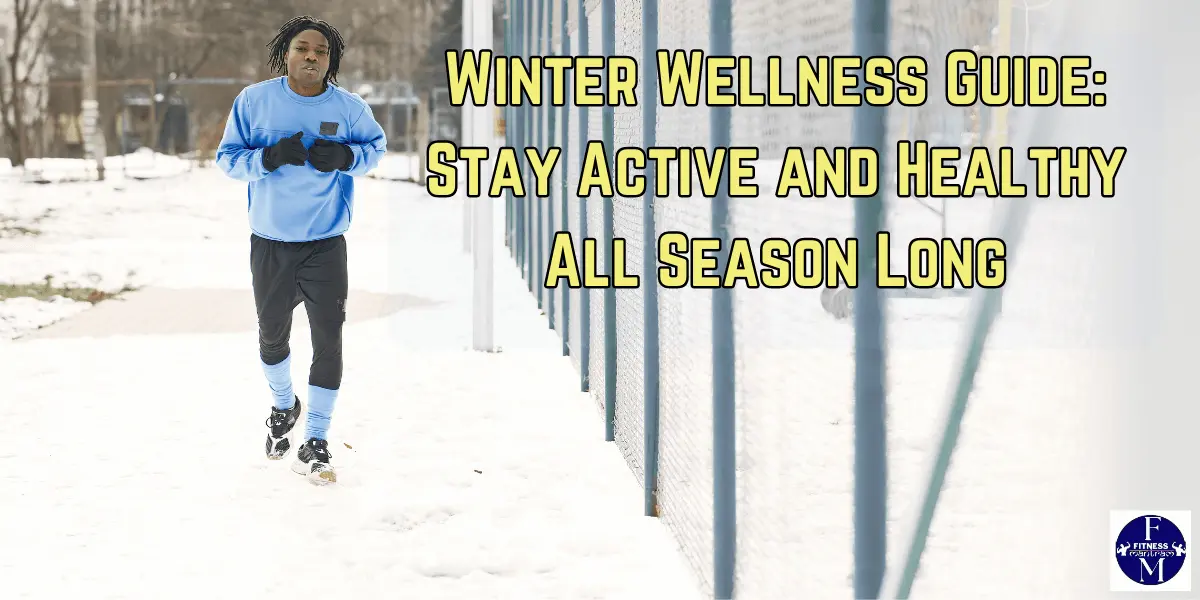Stay active and healthy all winter long with our comprehensive Winter Wellness Guide. Discover indoor and outdoor workout ideas, winter sports, immunity-boosting tips, healthy recipes, and self-care practices to combat seasonal affective disorder (SAD) and stay in top shape throughout the colder months. Embrace the winter season with our expert advice and maintain your fitness goals with confidence.
Winter Wellness Guide: Stay Active and Healthy All Season Long
Winter is a season often associated with cozy nights by the fireplace and indulging in hearty comfort food. To prevent weight gain, lethargy and the winter blues it is necessary to stay fit, healthy and to maintain healthy lifestyle throughout the entire winter season. If you love and enjoy this winter season and also want to stay fit and healthy, kindly go through this complete Winter wellness guide where you will get to know valuable tips, exercises, healthy winter recipe and strategies to stay active and healthy all season long. Let’s dive in!.
Introduction
The winter season can present unique challenges to maintaining a fitness routine. Cold temperatures, shorter daylight hours, and holiday festivities can easily disrupt our healthy habits. But you can easily handle these obstacles and thrive in your health and fitness journey by keeping the right mindset and following the strategic approach towards it.
Benefits of Winter Wellness
Before we dive into the tips and strategies, let’s explore the benefits of winter fitness. If you stay active and healthy during winter season you can achieve the following benefits
- The risk of winter seasonal illness like cold, viral and flu are reduced due to your strong immune system
- You can easily combat the winter blues which will help you to improve your mental well-being.
- Manage stress levels effectively, especially during the busy holiday season.
- Maintain a healthy weight and prevent winter weight gain.
- Enhance your cardiovascular health and overall fitness levels.
Importance of Winter Wellness
In winter season due to the cold weather and less outdoor activities, many individuals become sedentary. It is important to keep and maintain your fitness routine for your overall wellbeing. You can combat and overcome the negative effects of winter by engaging yourself in regular exercise and the adopting healthy habits. This will help you to emerge stronger both mentally and physically.
Layer Up for Outdoor Workouts
When it comes to outdoor workouts during winter, dressing appropriately is crucial. Layering up allows regulate your body temperature as you exercise and also keeps you warm. Here are some tips for dressing for outdoor winter workouts:
- Base Layer: Start with a moisture-wicking base layer that helps keep sweat away from your body.
- Insulating Layer: Add an insulating layer made of fleece or wool to provide warmth.
- Outer Layer: To protect yourself from the elements finish with a waterproof and windproof outer layer
- Outer Body Parts: Remember to keep your head, hands, and feet warm by wearing a hat, gloves, and warm socks.
- Opt for reflective gear: Since daylight hours are shorter during winter, choose gear with reflective elements for safety.
Remember, layering allows you to adjust your clothing as you warm up during your workout. Stay comfortable and enjoy your outdoor winter wellness exercise routine!.
Engaging Indoor Workouts

When the weather is too bad to follow your daily routine of outdoor exercise, to overcome this issue indoor workouts can be done to keep ourself active and engaged throughout the winter season. Here are a few ideas for engaging indoor workouts:
- At-home workouts: Utilize fitness apps or follow online workout videos that require minimal equipment.
- Indoor winter fitness classes: To maintain and follow daily exercise routine you can Join a nearby local gym or fitness centre which offers a different type of classes, such as yoga, Pilates, or indoor cycling.
- Dance workouts: To burn calories and to also lift your spirits, you can get your groove on by doing or joining dance workout
- High-Intensity Interval Training (HIIT): From the comfort of your house, in your daily workout routine you can incorporate bodyweight exercises for a full-body burn.
- Virtual workout sessions: Join live-streamed workout sessions or video conferences with fitness trainers and workout buddies to stay motivated and connected.
Engaging in indoor workouts not only keeps you fit but also provides an opportunity to explore new exercise routines and maintain your fitness journey throughout winter.
Outdoor Winter Sports and Activities

Winter is the best season which gives us a fantastic opportunity to engage our self in various sports that are unique according to the season. Embrace the cold and try out these exciting options to stay active and enjoy the winter wonderland:
- Skiing: Get ready and prepare yourself, hit the slopes to enjoy the adventurous thrill of downhill skiing or cross-country skiing. This is a good excellent full-body workout that help you to enhances your cardiovascular endurance and also help in to strengthens your lower body muscles.
- Snowboarding: Give yourself a challenge yourself of snowboarding, as this is one the best outdoor activity which combines elements of balance, strength, and coordination. It’s a fun way to work your core and lower body.
- Ice skating: Lace up your skates and glide on the ice. Ice skating improves balance, leg strength, and overall cardiovascular fitness.
- Winter hiking: Explore snowy trails and enjoy the peacefulness of nature. To improve and increase your cardiovascular fitness and also to build lower body strength, winter hiking is a great way to do this.
- Snowshoeing: It’s a low-impact type of exercise activity which provides you with an excellent cardiovascular workout. All you need is to get ready and lace up on a pair of snowshoes and then to go out to trek through the snow-covered landscapes
Engaging yourself in all such outdoor winter sport activities not only helps you to stay fit and healthy but also allows you to enjoy the beautiful nature of the season
Nutrition Tips for Winter Wellness

Winter brings its own set of dietary challenges, with holiday feasts and cravings for warm, comforting foods. To support your winter fitness goals, it’s essential to eat and nourish your body with nutritious meals to do so given below are some nutrition tips for winter to follow:
- Include seasonal fruits and vegetables: Winter offers a variety of produce such as citrus fruits, leafy greens, and root vegetables. Incorporate them into your meals for added vitamins and minerals.
- Keep your focus to have warm, hearty meals: In this segment you can Opt for different soups, stews, and variety of casseroles packed with vegetables, whole grains, and lean protein.
- Keep your self-hydrated: Although during the winter season you may be tempting to drink warm beverages, you shouldn’t forget to drink enough water so as to keep yourself hydrated.
- Limit sugary treats: While indulging in holiday treats is enjoyable, moderation is key. Balance your intake of sugary foods with healthier options.
- Consider supplements: Vitamin D and omega-3 fatty acid supplements can help compensate for the reduced sunlight exposure and support overall health during winter.
By following these nutrition tips, you can maintain a balanced diet and support your winter fitness journey.
Setting Realistic Goals in Winter Wellness
Setting realistic goals is crucial for maintaining motivation and tracking progress throughout the winter season. By establishing attainable targets, you can stay focused on your fitness journey. Here’s how to set realistic goals for winter fitness:
- Initially Start with small steps: If you want to achieve something big then first break down your goals into smaller one which are easily manageable tasks. Step by step keep moving to achieve them, this makes them less overwhelming and more achievable.
- Be specific and clear what you want to achieve: You can make up your mind what you want to achieve during this season, for example, instead of saying to yourself “I want to be healthy and fitter in this season,” specify Cleary “I will be able to run a 6K by the end of this winter season”
- Set a target: To stay on track and to add a sense of urgency, give yourself a target to work towards your goal.
- Keep Journal to track your progress: Maintain a fitness journal to keep record of your daily fitness routine, measurements, or other relevant metrics. As this fitness journal will allows you stay motivated to keep going, to see how far you’ve come and to make changes and modification if requires according to your fitness goal.
- Be flexible: Adapt your goals as needed. If you face unexpected challenges or changes in circumstances, be open to adjusting your targets.
By setting realistic goals, you can maintain focus, stay motivated, and make significant progress in your winter fitness endeavors.
Hydration: Remember to Drink Water.

As in other season it is equally important in winter season to stay hydrated. our body needs an adequate amount of water to function properly, even if we may not feel thirsty in this cold weather. Give below are reason why hydration matters in winter:
- Prevents dehydration: During winter we may think and feel that there is no need to drink much water, but the risk and possibilities of dehydration still remains. Therefore, it is important to stay vigilant and try to drink water sufficient amount of water throughout the day.
- Supports overall health: Proper hydration helps maintain body temperature, aids digestion, and promotes healthy skin.
- Combats dryness: Dry indoor air and exposure to cold weather can dehydrate our skin. Drinking enough water keeps our skin moisturized from the inside out.
By making a conscious effort to drink enough water, you can maintain proper hydration levels and optimize your winter fitness routine.
Overcoming Winter Workout Motivation Challenges:

It is a challenging to stay motivated during winter due to shorter daylight hours and cold temperature. But with the right strategies, you can easily overcome these obstacles and follow your daily workout routine consistently.
Here’s how to beat winter workout boredom and stay motivated:
- Find an accountability partner: Partner up with a friend or family member who shares your fitness goals. This way you can keep each other motivated.
- Mix up your routine: Avoid monotony by trying new workouts or classes. Explore different types of exercises to keep things exciting and engaging.
- Set rewards: Treat yourself to rewards when you reach certain milestones or achieve your goals. You can make it as simple by buying a new workout outfit, fitness tracker, or enjoying a relaxing spa.
- Create and manage your workout schedule: According to your fitness goal create and manage your workouts plan in advance and try to follow them accordingly in your daily or weekly schedule. Treating them as important appointments increases your commitment.
- Listen to music or podcasts: Create a motivating workout playlist or listen to engaging podcasts during your workouts. It helps pass the time and keeps you entertained
Thus, by implementing these simple strategies it becomes easy for you to overcome winter workout motivation challenge, and will help you in continuing our progress towards your fitness goal.
SAD: Combating Seasonal Affective Disorder
SAD- Seasonal Affective Disorder is a type of a feeling that mainly occurs during the winter season when sunlight is less. This creates a negative impact on our mood, energy level and our overall fitness. However, it can easily be over taken by doing regular exercise and following other mood boosting strategies that will help combat SAD symptoms
Given below are few tips how to manage SAD and promote your well-being during winter:
- Get sunlight exposure: Spend time outdoors during daylight hours, even if it’s overcast. Sunlight helps regulate mood and boosts vitamin D levels.
- Light therapy: Use a light therapy box that mimics natural sunlight. It can help alleviate SAD symptoms by providing the necessary light exposure.
- Exercise regularly: Keep yourself active by doing physical activity, our body releases endorphins commonly known as feel good hormones during this activity. Keep in mind to do to do minimum 30 minutes of regular exercise each day throughout the week
- Practice mindfulness and relaxation techniques: To reduce stress and promote mental well-being you can incorporate meditation, deep breathing exercises, or yoga into your daily routine schedule.
- Take Health care professional help if required: If you feel discomfort while performing your regular physical activity, any other symptoms persist or worsen, immediately consult with a healthcare professional. They can help you and provide further additional guidance and support if required.
By implementing these strategies, you can effectively manage SAD symptoms and maintain a positive mindset throughout the winter season.
Healthy Winter Wellness Recipes

Eating well during winter doesn’t mean sacrificing taste and comfort. With the proper healthy diet and the correct recipe, you can enjoy warm and nutritious meals that help and support you to reach your fitness goal
- Roasted Butternut Squash Soup: It is a creamy and flavourful soup that is packed with vitamins and minerals. Take roast butternut squash, onions, and garlic mix them altogether with vegetable broth and spices for a comforting meal.
- Baked Salmon with Roasted Vegetables: In oven bake season salmon fillets with herbs and lemon juice. Serve with a side of roasted winter seasonal vegetables, such as Brussels sprouts and carrots, for a entire and nourishing meal.
- Quinoa Stuffed Bell Peppers: Bake fill bell peppers with a mixture of cooked quinoa, black beans, corn, and spices until it all peppers are tender and the filling is heated through. It’s a protein-packed and satisfying dish.
- Warm Spinach Salad with Roasted Chicken: Take roast chicken breast and toss it with fresh spinach, cherry tomatoes, sliced almonds, and a light vinaigrette to prepare a salad filled with fiber, balanced protein and vitamins.
- Spiced Hot Cocoa: Warm up yourself with a healthier version of hot cocoa. Mix it with sugar free cocoa powder, mild hot almond milk, a dash of cinnamon, and a little amount of maple syrup to make a delicious and guilt-free treat.
To nourish your body with nutrition and satisfy your taste buds without compromising on your fitness goals incorporate these healthy winter recipes in to your meal plan.
Stay Active Indoors with Family and Friends

Indoor activities are good to engage yourself with your family and friends during winter season. It not helps us to complete our physical activity routine but also allow us to spend good and quality time together. Given below are some tips and ideas to stay active indoors with our family and friends
- Family workout ideas: Set aside designated workout times for the entire family. You can do bodyweight exercises, dance workouts, or even create a mini-circuit with different stations.
- Indoor activities for kids: Keep your little ones active and entertained with fun indoor games like hide-and-seek, treasure hunts, or building an obstacle course using pillows, furniture, and blankets.
- Virtual workout sessions: Join virtual workout classes or video conferences with your friends and exercise together. It helps and provide good accountability and a sense of motivation.
- Exercise challenges: Create friendly exercise challenges with your family or friends. It could be a weekly step challenge, a plank challenge, or a dance-off competition.
- Active gaming: Engage in active video games that require physical movement, such as dancing games or interactive sports simulations.
You will not only enjoy and have fun together with your family and friends by staying active indoors, but you will also strengthen your relationships and promote a healthy lifestyle.
Benefits of Winter Yoga

Yoga is a type of versatile practice that provides us with the benefits of both physical and mental health. During the winter season, incorporating yoga into your fitness routine can provide specific advantages. Here are some benefits of winter yoga:
- Boosts circulation: Yoga poses, combined with controlled breathing, enhance blood circulation and promote warmth in the body, which is especially beneficial in cold weather.
- Builds strength and flexibility: Regular yoga practice improves muscle strength, flexibility, and balance. It helps prepare your body for winter sports and activities.
- Enhances respiratory function: Deep breathing techniques in yoga help expand lung capacity and improve respiratory function. This can be beneficial during the winter months when cold air may cause discomfort.
- Reduces stress and anxiety: Winter can sometimes bring feelings of stress and anxiety. Yoga promotes relaxation, reduces cortisol levels, and calms the mind, helping you navigate through the season with greater ease.
- Supports immune function: Certain yoga poses and breathing exercises stimulate the lymphatic system, which plays a crucial role in immune function. By supporting your immune system, you can stay healthier during winter.
Hence by incorporating yoga into your daily winter fitness routine, you can feel and experience the unique benefits it offers and that helps you to improve your overall well-being.
Safety Tips for Outdoor Workouts
While outdoor workouts can be invigorating and enjoyable during winter, it’s crucial to prioritize safety. Cold temperatures and slippery conditions require extra precautions to prevent injuries. Here are some safety tips for outdoor workouts:
- Getting ready to dress yourself in layers: While going for an outdoor activity to keep yourself safe and to protect against the cold, you should wear moisture-wicking base layers, insulating middle layers, and windproof outer layers to regulate body temperature.
- Protect your extremities: To protect and keep warm your open body parts like hands, head, and feet, wear gloves, a hat, and warm socks to prevent frostbite
- Choose appropriate footwear: Opt for shoes with good traction to prevent slipping on icy surfaces. Consider using traction devices such as crampons or traction cleats for added stability.
- Warm up properly: Prioritize a dynamic warm-up to prepare your muscles and joints for exercise. Include exercises that increase your heart rate and warm your body.
- Stay visible: If exercising during low-light conditions, wear reflective clothing or use reflective gear to ensure visibility to motorists and other pedestrians.
Thus, by minimizing the risk of injuries, other cold-weather-related issues and following these safety tips, you can enjoy outdoor workouts safely.
Boosting Immunity During Winter
Colds, viral flu, and other illnesses are more common during the winter season hence it is crucial and necessary to maintain a strong immune system. If you follow and adopt good healthy habits, incorporate immune-boosting strategies, you can easily stay healthy and ward off seasonal illnesses. Given below are some tips for boosting immunity during cold weather season
- Eat a balanced diet: To get necessary nutrients for a strong immune system focus on to take foods that are rich in vitamins and minerals, such as fruits, vegetables, whole grains, lean protein, and healthy fats.
- Stay hydrated: To flush out toxins from the body, drink enough water to supports immune function.
- Prioritize sleep: Take a proper good sleep of minimum 7-9 hours each night. Sufficient rest enhances immune response and overall well-being.
- Manage stress: Keep yourself engage in various stress-reducing activities such as yoga, meditation, or spending time with loved ones, as chronic stress weakens the immune system.
- Supplement wisely: To enhance your immune system consult with a certified healthcare professional about vitamin and other mineral supplements to support and boost your immune health, which include as vitamin C, vitamin D, and zinc.
In this way if you follow and adopt these strategies during the cold weather season you can strengthen your immune system and reduce the risk of getting ill, during the winter season .
The Importance of Rest and Recovery
While staying active and maintaining a consistent fitness routine is essential, it’s equally crucial to prioritize rest and recovery. Rest allows your body to repair and recharge, reducing the risk of overtraining and injuries. Here’s why rest and recovery are important during winter:
- Muscle repair and growth: Rest days give your muscles time to repair and rebuild, enhancing strength and performance.
- Injury prevention: Overtraining without proper rest can lead to overuse injuries and burnout. Rest allows your body to recover and reduces the risk of injuries.
- Mental rejuvenation: Rest and recovery not only benefit your body but also your mind. Taking breaks from intense workouts helps prevent mental fatigue and promotes overall well-being.
- Sleep quality: Proper rest and recovery support healthy sleep patterns, ensuring you get adequate and restorative sleep during the winter season.
By allowing yourself proper rest and recovery, you can optimize your fitness journey, prevent injuries, and maintain overall well-being during winter.
Incorporating Strength Training
Not only in winter season strength training is an essential part of any fitness routine. As it offers various health benefits like as enhanced metabolism, improved bone density and increased muscle strength. Given below are some facts why incorporating strength training into your daily winter fitness regimen is essential?
- Muscle development: By doing strength training it help us to builds lean muscle mass, which further increases the overall body strength and improves your ability to perform daily activities.
- Improved metabolism: During the cold weather season when outdoor activities are limited, strength training helps in to boosts your metabolism which helps to burn calories even at rest.
- Improved bone health: By doing weight-bearing exercises strength training helps to promote bone density which reduce the risk of osteoporosis.
- Injury prevention: During winter season while performing outdoor sport activities strength training helps strong muscles and joints to provide stability and support and also reduce the risk of injuries
- Functional fitness: Strength training improves your ability to perform everyday tasks, making winter activities like shovelling snow or carrying groceries easier and safer.
In this way if you follow and adopt these strategies during the winter season you can build strength, improve your overall fitness, and enhance your ability to enjoy winter activities.
Cardiovascular Exercises for Winter
Cardiovascular exercises are vital for maintaining a healthy heart, improving endurance, and burning calories. While outdoor cardio workouts may be challenging during winter, there are plenty of indoor options to keep your heart pumping. Here are some cardiovascular exercises for winter:
- Indoor cycling: It is the best low-impact yet intense cardio workout that strengthens your legs and improves cardiovascular endurance. Get a stationary bike setup at home or join a cycling class at your local gym, to improves your cardio vascular health
- HIIT for winter fitness: During winter you can perform HIIT workouts at home using bodyweight exercises like burpees, mountain climbers, and jump squats.
- Dance workouts: Dancing is a type of fun and enjoyable activity, it is also an effective way to elevate your heart rate, to burn calories, and also to improve coordination. Turn on the music and get your body moving with dance workouts. Whether you follow choreographed routines or freestyle.
- Jump rope: Grab a jump rope and jump your way to cardiovascular fitness. It can be done indoors, making it a convenient and easy option for during winter workouts. Jumping rope is a high-intensity exercise that help us to improves cardiovascular endurance, agility, and coordination
- Indoor swimming: It provides resistance while being gentle on the joints. Whether you swim laps or participate in water aerobics, swimming keeps you active and engaged during winter. If you have access to an indoor pool, you should do swimming, as it is an excellent full-body cardio workout.
Hence you can maintain your cardiovascular health, burn calories, and stay active even when outdoor options are limited, by incorporating these cardiovascular exercises into your winter wellness routine.
Mind-Body Connection: Winter Meditation
It essential to prioritize mental well-being, even though winter is a busy and stressful time. Meditation can be performed during winter as it is a powerful tool to practice that promotes relaxation, mindfulness, and inner peace. By incorporating meditation into your winter routine, you can cultivate a strong mind-body connection and reduce stress. Here’s how winter meditation can benefit you:
- Stress reduction: Meditation is a form of yoga practice that is well known for its ability that help us to reduce stress levels. You need to take a few moments from your busy schedule every day to focus on your breath to do mediation, in this way you can remove the unwanted pressures and anxieties that come with the winter season.
- Mindfulness exercises: This exercise helps you appreciate the beauty of nature during winter, let go of all the negative thoughts, and to find joy in the present. Winter meditation encourages mindfulness, this is the practice of being fully present in the moment.
- Improved sleep: The relaxation and mental calmness that is induced due to meditation practice can help us to get good sleep. This is especially beneficial during the winter season when the lack of sunlight disrupts our sleep patterns.
- Emotional well-being: It help us to promotes a sense of gratitude, compassion and resilience. which positively impact your overall mood and outlook. Winter meditation helps us to regulate emotions and enhances our emotional well-being
- Stress reduction techniques: Meditation helps us by providing valuable stress reduction techniques that can be applied in to various aspects of your life. It equips you with tools to manage stressful situations more effectively.
Stretching and Flexibility in Cold Weather

During Winter it is also essential to maintain flexibility for overall fitness and to prevent injury. As during winter, the cold weather may make our muscles feel tighter. Therefore, it is necessary to Incorporate stretching exercises into your routine to improve flexibility, enhance joint mobility, and alleviate muscle tension. Here’s how to prioritize stretching and flexibility during cold weather:
- Warm up before stretching: Prior to stretching, engage in a brief warm-up to increase blood flow to your muscles. This can include light cardio exercises like jogging in place or jumping jacks.
- Dynamic stretching: Perform dynamic stretches that involve moving parts of your body through a full range of motion. Examples include arm circles, leg swings, and walking lunges.
- Static stretching: After your workout or as a standalone routine, engage in static stretches that target major muscle groups. Stay in each stretch position for 15-30 seconds without bouncing or forcing the next stretch.
- Focus on tight areas: Pay attention to areas that tend to tighten during winter, such as the neck, shoulders, and hips. Incorporate specific stretches to alleviate tension in these areas.
- Listen to your body: Stretching should never cause pain. Listen to your body’s signals so as to avoid overstretching. Gradually increase in steps the frequency of your stretches over time.
In this way as shown above you can improve your range of motion, prevent muscle imbalances, and maintain optimal physical function, by incorporating stretching and flexibility exercises into your winter fitness routine.
Frequently Asked Questions
Q: What makes winter fitness essential?
A: Winter fitness is important because it helps boost our immune system, enhances mood, prevents weight gain, and improves cardiovascular health.
Q: How can we stay active in cold weather?
A: By incorporating exercises such as indoor workouts, layering up for outdoor activities, and participating in winter sports, we can stay active even in cold weather.
Q: What are some winter wellness practices?
A: Some winter wellness practices include maintaining a balanced diet, staying hydrated, managing stress levels, and setting realistic fitness goals.
Q: What are some examples of realistic winter fitness goals?
A: Examples include running a certain distance, mastering a new exercise routine, or improving flexibility through regular stretching.
Q: Why is it important to track progress during winter fitness?
A: Tracking progress helps you stay motivated, identify areas for improvement, and celebrate milestones throughout your fitness journey.
Q: How can I set effective goals for my winter fitness journey?
A: Start with realistic and specific goals, track your progress, and adjust your targets as needed. Celebrate your achievements along the way!
Q: How much water is recommended to drink during winter?
A: As suggested it is required to drink minimum at least eight cups (64 ounces) of water each day. If you engage in intense workouts or spend extended periods outdoors, adjust your intake accordingly.
Q: Why is hydration important for winter fitness?
A: Hydration is vital for winter fitness as it supports energy levels, joint lubrication, and nutrient transport throughout the body.
Q: How can I stay motivated to exercise during the winter season?
A: Find an accountability partner, vary your workouts, set rewards, create a workout schedule, and listen to music or podcasts to stay motivated and beat winter workout boredom.
Q: What are some strategies to overcome workout boredom during winter?
A: Explore new workout routines, try different classes, incorporate fun activities, and change your workout environment to keep things fresh and exciting.
Q: How can having a workout partner help me stay motivated during winter?
A: A workout buddy is very beneficial as they help us to stay on track and also make our workout more enjoyable. They also provide us mental support, encourage us to stay motivated to achieve our goal, hence they create great accountability in our fitness journey.
Q: What are the tricks and strategies to manage and overcome seasonal affective disorder (SAD) symptoms?
A: These are simple and easy strategies that anyone can follow, which include sunlight exposure, light therapy, regular exercise, mindfulness practices, and taking professional help when required.
Q: How can light therapy help combat SAD symptoms?
A: Light therapy exposes you to artificial light that mimics sunlight, helping regulate mood and alleviate SAD symptoms.
Q: How does exercise help combat SAD?
A: Regular exercise releases endorphins, which improve mood, reduce stress, and combat the symptoms of seasonal affective disorder.
Q: What are some examples of nutritious winter meals?
A: Nutritious winter meals include roasted butternut squash soup, baked salmon with roasted vegetables, quinoa stuffed bell peppers, warm spinach salad with roasted chicken, and spiced hot cocoa.
Q: How can I make healthier versions of comfort foods for winter?
A: Substitute ingredients with healthier alternatives, such as using whole grains instead of refined grains or replacing heavy cream with Greek yogurt, to make comfort foods healthier.
Q: What are some warm and healthy drinks for winter?
A: Spiced hot cocoa, herbal teas, and warm lemon water with ginger are great options for warm and healthy drinks during winter.
Q: How can I involve my family in staying active during winter?
A: Set aside dedicated workout times, engage in fun activities like indoor games, join virtual workout sessions, and create exercise challenges to involve your family in staying active.
Q: What are some engaging indoor activities for kids during winter?
A: Ideas include hide-and-seek, treasure hunts, building obstacle courses, and active video games that encourage physical movement.
Q: How can virtual workout sessions with friends be beneficial during winter?
A: Virtual workout sessions provide social interaction, accountability, and the motivation to exercise together, even when physically apart.
Q: How does yoga contribute to winter wellness?
A: Yoga boosts circulation, builds strength and flexibility, enhances respiratory function, reduces stress, and supports immune function, making it an ideal practice for winter wellness.
Q: What are some relaxation techniques in yoga that can benefit us during winter?
A: Deep breathing exercises, meditation, and gentle stretching are relaxation techniques in yoga that can help manage stress and anxiety during winter.
Q: How does yoga promote mindfulness during winter?
A: Yoga provides mindfulness not only in winter season but to every practioner irrespective of season. It deepens the mind-body connection, cultivate a sense of gratitude and contentment by encouraging and focusing on the present moment
Q: What precautions should I take for outdoor workouts during winter?
A: Dress in layers, protect your extremities, choose appropriate footwear, warm up properly, and ensure visibility with reflective gear to stay safe during outdoor workouts.
Q: How can I ensure outdoor exercise safety during winter?
A: By being mindful of your clothing choices, protecting your extremities, wearing proper footwear, warming up adequately, and staying visible, you can minimize the risk of injuries during outdoor workouts.
Q: Why is it necessary to take precautions while performing outdoor workouts during cold weather winter season?
A: During winter there is chance that increase the risk of hypothermia, frostbite, and injuries. Taking precautions ensures your safety and well-being during outdoor exercise in winter.
Q: How can I boost my overall wellness during winter?
A: Boost your winter wellness by eating a balanced diet, staying hydrated, prioritizing sleep, managing stress, and considering immune-supporting supplements.
Q: What are the immune-boosting dietary supplements that can be helpful during winter?
A: To help support immune function during winter some of Immune-boosting dietary supplements are vitamin C, vitamin D, zinc, and probiotics.
Q: During winter, what are the examples of vitamin C-rich foods that are beneficial to improve immune health?
A: In winter season foods contains vitamin C, include fruits and vegetables spinach, and kiwi fruit, oranges, peppers with seeds, and broccoli, are the types of foods that are suggested to take most in this season.
Q: How does rest and recovery contribute to healthy sleep habits during winter?
A: Prioritizing rest and recovery promotes healthy sleep patterns, allowing you to get adequate and restorative sleep during winter.
Q: What are some effective strategies for rest and recovery during winter fitness routines?
A: Strategies include incorporating active rest days, practicing relaxation techniques, getting quality sleep, and listening to your body’s cues for rest.
Q: What are active rest days, and why are they important during winter fitness routines?
A: Active rest days involve low-intensity activities like stretching, yoga, or gentle walks. They promote recovery, improve flexibility, and enhance overall fitness during winter.
Q: Why is strength training important during winter?
A: Strength training enhances muscle development, boosts metabolism, improves bone health, prevents injuries, and enhances functional fitness during the winter season.
Q: What are the advantages of incorporating resistance training into our daily winter fitness routine?
A: During winter activities resistance training help us to increase muscle strength, to promotes a healthy metabolism, to improves bone density and also to reduce the risk of injuries.
Q: Can bodyweight exercises be effective for strength training during winter?
A: Absolutely! Bodyweight exercises are most effective in building strength, bodyweight exercises such as push-ups, squats, and planks can be done at home or any other place without equipment.
Q: What are some cardio exercises suitable for winter workouts?
A: Indoor cycling, HIIT workouts, dance workouts, jump rope, and indoor swimming are great options for cardio during the winter season.
Q: How does indoor cycling benefit winter fitness?
A: Indoor cycling can be done in the comfort of your own home, it is a low-impact cardio workout, that strengthens leg muscles and improves endurance.
Q: What are the advantages of HIIT workouts for winter wellness?
A: It can be adapted to various fitness levels and preferences as HIIT workouts are time-efficient that helps us to burn calories and to improve cardiovascular fitness.
Q: How does meditation contribute to winter wellness?
A: Meditation reduces stress, encourages mindfulness, improves sleep quality, enhances emotional well-being, and equips individuals with stress reduction techniques for winter wellness.
Q: What are some mindfulness exercises that can be practiced during winter meditation?
A: Mindfulness exercises include focusing on the breath, observing sensations in the body, practicing gratitude, and engaging in visualizations of peaceful winter scenes.
Q: Does meditation help reduce stress during cold weather?
A: Meditation is a type of practice in yoga that help us to concentrate at the present situation which help us to calm and relax, which further help us to reduce our stress levels.
Q: How can I prioritize stretching and flexibility during winter workouts?
A: Warm up before stretching, incorporate dynamic and static stretches, focus on tight areas, and listen to your body’s signals to ensure safe and effective stretching routines during winter.
Q: What are some flexibility exercises suitable for cold weather workouts?
A: Examples include neck stretches, shoulder rolls, hip openers, standing hamstring stretches, and yoga poses that target flexibility.
Q: Why is it essential to do warm up before stretching in winter season?
A: Warming up help to increase the blood flow to the muscles, making them more pliable and further help to reduce the risk of injury during stretching.
Q: How regularly should I need to do exercise during winter?
A: 150 minutes of moderate-intensity aerobic activity or minimum 75 minutes of vigorous-intensity aerobic activity each week, along with some strength training exercises twice a week should be followed.
Q: Can I exercise outdoors in cold weather?
A: Yes, definitely you can do exercise outdoors in winter, but it is important to take precautions by dressing warmly, protecting your extremities, and should be aware of icy conditions.
Q: Should I drink water during winter workouts?
A: Yes, staying hydrated is important even in cold weather. You can drink water before and after your workouts so as to maintain optimal hydration levels.
Q: Are there any specific type of exercises that I should avoid during winter season?
A: Avoid exercising outdoors in extreme weather conditions. If outdoor conditions are unsafe for exercise or if you have certain health related issues, you can opt for indoor workouts instead.
Q: Can I continue my winter wellness routine if I have a cold or flu?
A: Always listen to your body and give yourself some time to heal before resuming your winter wellness routine. It’s normally recommended to take rest and get fully recover when you’re sick with a cold or flu before you start your fitness routine
Q: How can I stay motivated to do exercise during winter season?
A: Find activities you enjoy, set realistic goals, vary your workouts, find a workout buddy, and reward yourself for reaching milestones to stay motivated during winter.
Conclusion
Winter doesn’t have to be a season of hibernation and inactivity. By following this winter wellness guide: Stay Active and Healthy All Season Long, you can embrace the colder months and maintain your fitness journey. I hope this guide provides comprehensive insights from nutrition tips and hydration strategies to winter sports and activities, goal setting, and self-care practices, to help you stay active, healthy, and motivated during winter.
It is not necessarily which type pf workout pattern you choose either indoor workouts or outdoor adventures, or a combination of both, it is important to stay active, maintain a well-balanced healthy lifestyle that can bring various benefits to your overall physical and mental well-being. Most important is to prioritize safety first and to listen your body, and adapt your winter wellness routines as needed. So, get ready and lace up your winter boots, grab your workout layer, and embark on to your winter fitness journey that will help you to you active, healthy, and thriving all season long!
All the best! Stay Motivated, Stay Healthy!
You May Also Like to Read
- Art Of Skin Care – The Science Of Beautiful Skin
- Best Green Tea for Weight Loss
- 10 Trendy Ways To Improve Your Fitness
- Best Way To Get Your Splits Right
- The Power of a 28-Day Workout Challenge
Disclaimer : The details & information given here in this article is based on information as available on other published site on internet. Do take medical advice before adopting it. Fitness Mantram Does Not Confirm It. This site contains affiliate links. If you choose to make a purchase after clicking a link the author/owner/creator may receive a commission at no ADDITIONAL cost to you. Thank you for your support!
